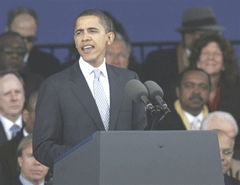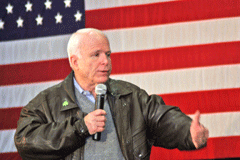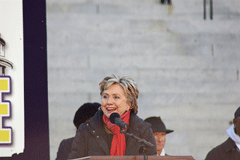The Candidates on Climate
Air Date: Week of February 22, 2008
The presidential hopefuls are starting to take shots at each other’s global warming plans. All three favor capping carbon emissions. But Living on Earth’s Jeff Young tells us they're looking for ways to draw distinctions among their climate change approaches.
Transcript
ANNOUNCER: Support for Living on Earth comes from the National Science Foundation and Stonyfield Farm.
[THEME]
CURWOOD: From the Jennifer and Ted Stanley studios in Somerville Massachusetts, this is Living on Earth. I’m Steve Curwood. With John McCain the likely Republican nominee to face either Hillary Clinton or Barack Obama, the fall’s presidential match up is beginning to take shape.
And the candidates are starting to take a few shots at one another’s plans to address global warming. All three favor capping carbon emissions. But the candidates are already looking for ways to draw distinctions, and show voters that theirs is the best approach to tackle climate change. Living on Earth’s Jeff Young has the story.
YOUNG: A little over a year ago, in January of ‘07, U.S. Senators packed the environment committee room to share ideas on climate change. It so happened that Senators John McCain of Arizona and Barack Obama of Illinois spoke back to back. Obama heaped praise on his Republican colleague, who, along with Connecticut’s Joe Lieberman, had proposed the first climate change bill.

Illinois Senator Barack Obama
(Courtesy of U.S. House of Representatives)
YOUNG: Obama liked McCain’s Climate Stewardship Act. The Act proposed what’s known as a cap and trade approach - set a mandatory ceiling on overall emissions of CO2, then allow companies to buy and sell permits for those emissions. Obama and New York Senator Hillary Clinton liked the bill so much they joined McCain as cosponsors. What a difference a year makes. Now Obama sees McCain as his likely rival in the race for the White House, and he sees big problems with McCain’s climate plan. Obama told reporters at a campaign event in Seattle this month that his plan is better.
OBAMA: All polluters will have to pay based on the amount of pollution they release into the sky. The market will set the price, but unlike other cap and trade proposals that have been offered in this race, no business will be allowed to emit any greenhouse gases for free. Businesses don’t own the sky - the public does.
YOUNG: Obama says under McCain’s proposal, many companies would receive free emissions permits while his plan calls for an auction of all permits. The money raised would go toward clean energy, increasing efficiency and helping people with low incomes pay heating bills.

Arizona Senator John McCain. (Courtesy of John McCain 2008)
JENKINS: You can have all the plans in the world but if you don’t exercise leadership, it doesn’t really do you much good. McCain has been doing the legwork to move this issue forward. The other candidates, Senator Clinton and Senator Obama, they’ve articulated a good position, they’ve signed onto some bills, they’ve come up with a plan, but they haven’t exercised leadership and that’s where the distinction is.
YOUNG: But some of McCain’s recent comments on climate change raised some eyebrows. During last month’s debate in Florida, hosted by MSNBC, moderator Tim Russert asked McCain about his plan.
RUSSERT: Senator McCain, you are in favor of mandatory caps.
MCCAIN: No, I am in favor of cap-and-trade. And all we are saying is, look, you can reduce your greenhouse gas emissions; you earn a credit. Somebody else is going to increase theirs; you can sell it to them. And meanwhile we have a gradual reduction in greenhouse gas emissions.
YOUNG: That answer puzzled many climate policy observers. McCain had explained the trade part of his plan well, but the cap part is, by any definition, mandatory - a limit set by law. In an interview this month, George Stephanopoulos of ABC asked McCain much the same question Russert had.
STEPHANOPOULOS: How about on the issue of climate change? Because you and Senator Lieberman have come out for a bill which would have mandatory reductions in greenhouse gases.
MCCAIN: Gradual reductions, yes.
STEPHANOPOULOS: But they are mandatory.
MCCAIN: Yes.
STEPHANOPOULOS: Are you sticking by that?
YOUNG: So, why does McCain now say yes to mandatory caps when he said no in Florida? Again, Dave Jenkins of Republicans for Environmental Protection.
JENKINS: Well, I don’t think there’s two different answers. I think in the Florida debate what he was simply doing was drawing a distinction with the audience that he’s not in favor of just a simple, mandatory cap on carbon emissions, but he’s in favor of a more market-friendly cap and trade system. A hard cap without that market aspect would be a very different thing, and would probably have a very different appeal to the Republican primary voter.
YOUNG: Out on the campaign trail, Hillary Clinton has been using her global warming plan as a way to talk not just about the environment, but the economy. Here’s Clinton on the stump in Youngstown, Ohio.

New York Senator Hillary Clinton. (Photo: Flickr/Justin Shearer)
CLINTON: One of us has a plan to revive our economy right now by creating millions of new clean-energy jobs. Green collar jobs - 5 million of them - jobs we’ll create by investing oil companies’ record profits in clean, renewable energy.
[CHEERS]
YOUNG: All the candidates have talked about clean energy jobs. But Clinton has been hammering the point the hardest. That’s likely because her strongest voter base has been working class Democrats who are very concerned about the economy. A glance at the primary election calendar shows that will be especially important in the coming weeks. Clinton looks for a comeback in Ohio, Texas and Pennsylvania, where she hopes blue- collar voters will respond to her plan for green collar jobs.
For Living on Earth, I’m Jeff Young in Washington.
Links
Sen. Clinton’s “green jobs” plan
Sen. McCain’s speech on energy policy
Sen. Obama details his climate change plan
All of LOE’s campaign coverage, including the first presidential forum on global warming
Living on Earth wants to hear from you!
Living on Earth
62 Calef Highway, Suite 212
Lee, NH 03861
Telephone: 617-287-4121
E-mail: comments@loe.org
Newsletter [Click here]
Donate to Living on Earth!
Living on Earth is an independent media program and relies entirely on contributions from listeners and institutions supporting public service. Please donate now to preserve an independent environmental voice.
NewsletterLiving on Earth offers a weekly delivery of the show's rundown to your mailbox. Sign up for our newsletter today!
 Sailors For The Sea: Be the change you want to sea.
Sailors For The Sea: Be the change you want to sea.
 The Grantham Foundation for the Protection of the Environment: Committed to protecting and improving the health of the global environment.
The Grantham Foundation for the Protection of the Environment: Committed to protecting and improving the health of the global environment.
 Contribute to Living on Earth and receive, as our gift to you, an archival print of one of Mark Seth Lender's extraordinary wildlife photographs. Follow the link to see Mark's current collection of photographs.
Contribute to Living on Earth and receive, as our gift to you, an archival print of one of Mark Seth Lender's extraordinary wildlife photographs. Follow the link to see Mark's current collection of photographs.
 Buy a signed copy of Mark Seth Lender's book Smeagull the Seagull & support Living on Earth
Buy a signed copy of Mark Seth Lender's book Smeagull the Seagull & support Living on Earth

